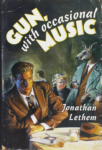In the August 2002 issue of GQ (with Vin Diesel on the cover), “Nine writers remember the first time they heard the music that changed their lives.” The nine writers are Kurt Loder, Eric Bogosian, David Gates, Russell Banks, Junot Diaz, T.C. Boyle, Joe Jackson, Terrence Rafferty, and . . . waaay back on page 175, Jonathan Lethem. — Cassie
The summer of 1980, I was 16 and unpersuasively cool. I listened to the Ramones and clung to a thin claim of having been “there”–meaning CBGB, which at the time let you in without an ID. But I meant to be a writer and had begun favoring Talking Heads and Elvis Costello, music that buffered emotionality in layers of cleverness and metaphor and postures of alienation. I spent a lot of afternoons at my desk, writing stuff that wasn’t any good. One such day that summer, the deejay on WNEW came on and announced a debut single “by a New York poet turned rock ‘n’ roller.” I sneered in advance–this would probably be some flowery singer-songwriter, about as tough as Billy Joel. Then the deejay dropped the needle on Jim Carroll’s “People Who Died,” which by the end of one snarling, anguished chorus had wrecked the walls of my pretensions. The song was a ticking bomb of rage at loss–They were all my friends, and they died! Carroll moans, as astonished that he’s found a voice to report it as he is at the gruesome fact of death itself. Though I’d have to learn the lesson a thousand times again, Carroll’s channeled beatnik vulnerability, shrouded in punk rage, was the first rebuke to my foolish hope that being a writer could mean skirting my emotions. No, it would always mean ramming straight into them. Carroll had put me on notice.
The deejay let the song finish, then immediately played it again: He–and I–was that impressed. I still am. Nothing else of Carroll’s has had that impact on me, but it hardly matters; “People Who Died” is breaking me open still, and there’s room for only so many songs like that in your life. Even if Carroll had somehow managed a career that kept that song’s impossible promise, punk–or life–isn’t always about keeping the promises you make but daring to make them in the first place. That’s what “People Who Died” knew that I didn’t and why it broke my heart twice quickly in succession, before I’d completely understood it could be broken–and why the song goes on breaking it now that I’ve learned.
Jonathan Lethem is the author of Motherless Brooklyn; Amnesia Moon; Gun, with Occasional Music; and other works. Click on the images below for more information on Amazon.com.



